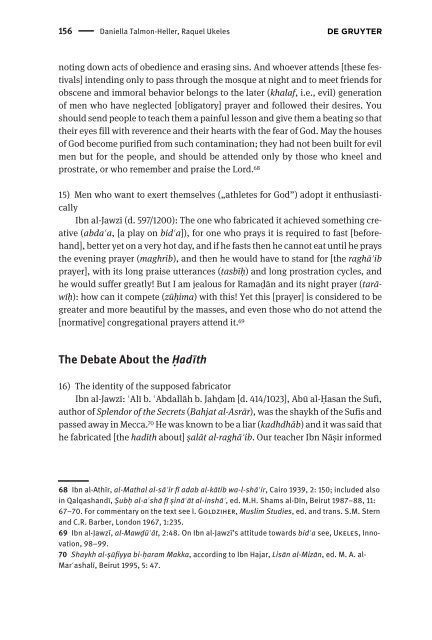0021-1818_islam_98-1-2-i-259
0021-1818_islam_98-1-2-i-259
0021-1818_islam_98-1-2-i-259
You also want an ePaper? Increase the reach of your titles
YUMPU automatically turns print PDFs into web optimized ePapers that Google loves.
156 Daniella Talmon-Heller, Raquel Ukeles<br />
noting down acts of obedience and erasing sins. And whoever attends [these festivals]<br />
intending only to pass through the mosque at night and to meet friends for<br />
obscene and immoral behavior belongs to the later (khalaf, i.e., evil) generation<br />
of men who have neglected [obligatory] prayer and followed their desires. You<br />
should send people to teach them a painful lesson and give them a beating so that<br />
their eyes fill with reverence and their hearts with the fear of God. May the houses<br />
of God become purified from such contamination; they had not been built for evil<br />
men but for the people, and should be attended only by those who kneel and<br />
prostrate, or who remember and praise the Lord. 68<br />
15) Men who want to exert themselves („athletes for God”) adopt it enthusiastically<br />
Ibn al-Jawz\ (d. 597/1200): The one who fabricated it achieved something creative<br />
(abda^a, [a play on bid^a]), for one who prays it is required to fast [beforehand],<br />
better yet on a very hot day, and if he fasts then he cannot eat until he prays<br />
the evening prayer (maghrib), and then he would have to stand for [the ragha#ib<br />
prayer], with its long praise utterances (tasbih) and long prostration cycles, and<br />
he would suffer greatly! But I am jealous for Ramadan and its night prayer (tarawih):<br />
how can it compete (zuhima) with this! Yet this [prayer] is considered to be<br />
greater and more beautiful by the masses, and even those who do not attend the<br />
[normative] congregational prayers attend it. 69<br />
The Debate About the H · adīth<br />
16) The identity of the supposed fabricator<br />
Ibn al-Jawz\: ^Al\ b. ^Abdallah b. Jahdam [d. 414/1023], Abu al-0asan the Sufi,<br />
author of Splendor of the Secrets (Bahjat al-Asrar), was the shaykh of the Sufis and<br />
passed away in Mecca. 70 He was known to be a liar (kadhdhab) and it was said that<br />
he fabricated [the hadith about] salat al-ragha#ib. Our teacher Ibn Nasir informed<br />
68 Ibn al-Ath\r, al-Mathal al-sa#ir fi adab al-katib wa-l-sha^ir, Cairo 1939, 2: 150; included also<br />
in Qalqashand\, Subh al-a^sha fi sina^at al-insha#, ed. M.H. Shams al-D\n, Beirut 1<strong>98</strong>7–88, 11:<br />
67–70. For commentary on the text see I. Goldziher, Muslim Studies, ed. and trans. S.M. Stern<br />
and C.R. Barber, London 1967, 1:235.<br />
69 Ibn al-Jawz\, al-Mawdu^at, 2:48. On Ibn al-Jawz\’s attitude towards bid^a see, Ukeles, Innovation,<br />
<strong>98</strong>–99.<br />
70 Shaykh al-sufiyya bi-haram Makka, according to Ibn Hajar, Lisan al-Mizan, ed. M. A. al-<br />
Mar^ashal\, Beirut 1995, 5: 47.


